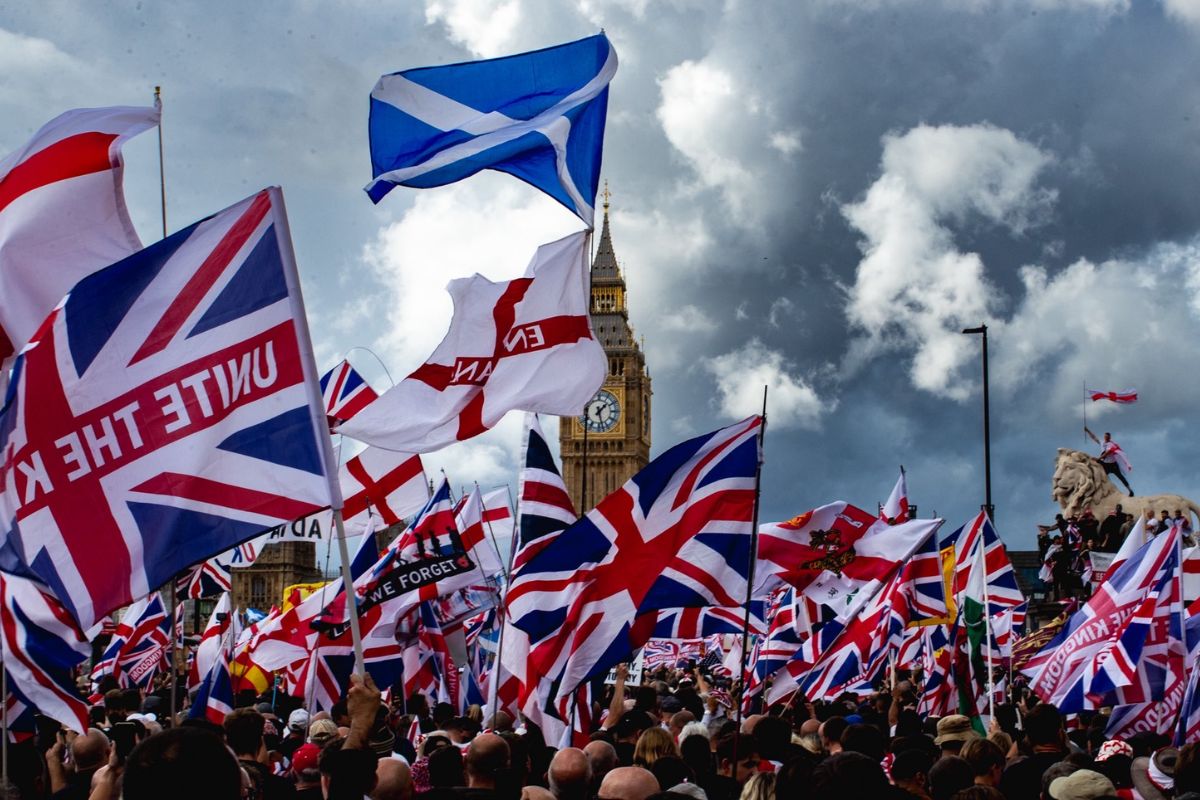The monster ‘Unite the Kingdom’ demonstration on Saturday 13 September marks a turning point. Some are calling it the biggest far-right demonstration in British history. This event deserves a thorough – but sober – analysis.
This was, unequivocally, a major setback and embarrassment for the left. The counter-demo was significantly outnumbered, by at least twenty-to-one.
The mood amongst the right in the wake of their mass gathering, by contrast, is jubilant. The reactionary scum of Britain will no doubt feel emboldened. This means more St George’s flags and anti-asylum-seeker protests, and more racist attacks on minorities.
Like with last summer’s riots, this represents a real threat, which must be countered with the organised force of the working class.
There is also a sense of fear amongst a section of workers and young people – particularly in Muslim, black, and Asian communities.
The sight of hundreds of thousands of flag-waving nationalists parading through the streets sends a message that the right wing are in the ascendancy; that reaction is on the march.
But the shimmering surface of events can often be blinding: obscuring what lies beneath, and distorting the real picture. It is our job, as Marxists, to look beneath the surface, understand the deeper processes taking place, and grasp the reality of the situation.
Was this a surprise?
The more ‘liberal’ wing of the ruling class now stands aghast at the menace of the far right. The spectre of last summer’s violent disorder haunts them.
‘Sir’ Keir Starmer, champion of human rights that he is, has rushed to issue a statement condemning the Unite the Kingdom (UTK) demonstration.
“Britain is a nation proudly built on tolerance, diversity and respect,” the Prime Minister said. “Our flag represents our diverse country and we will never surrender it to those that use it as a symbol of violence, fear, and division.”
Fine words, indeed. But such language stands in remarkable contrast to that issued by our respectable PM just a few short months ago, when, evoking Enoch Powell, he said that Britain risked becoming an “island of strangers”, due to rising immigration.
And what about ‘our’ government’s record levels of deportations, which Labour ministers brag about on social media? What about their tightening of immigration controls? What about their promises to “detain and send back” small boats of refugees crossing the Channel?
We say to Starmer: What did you expect? You are responsible for fanning the flames that led to 13 September. Your government has carried out an onslaught against the working class, tearing at the fabric of society.
These ladies and gentlemen can point the finger anywhere they like. But the blame for the rise of right-wing reaction lies squarely on the shoulders of the liberal establishment, who have plunged Britain into chaos. That is their cross to bear.
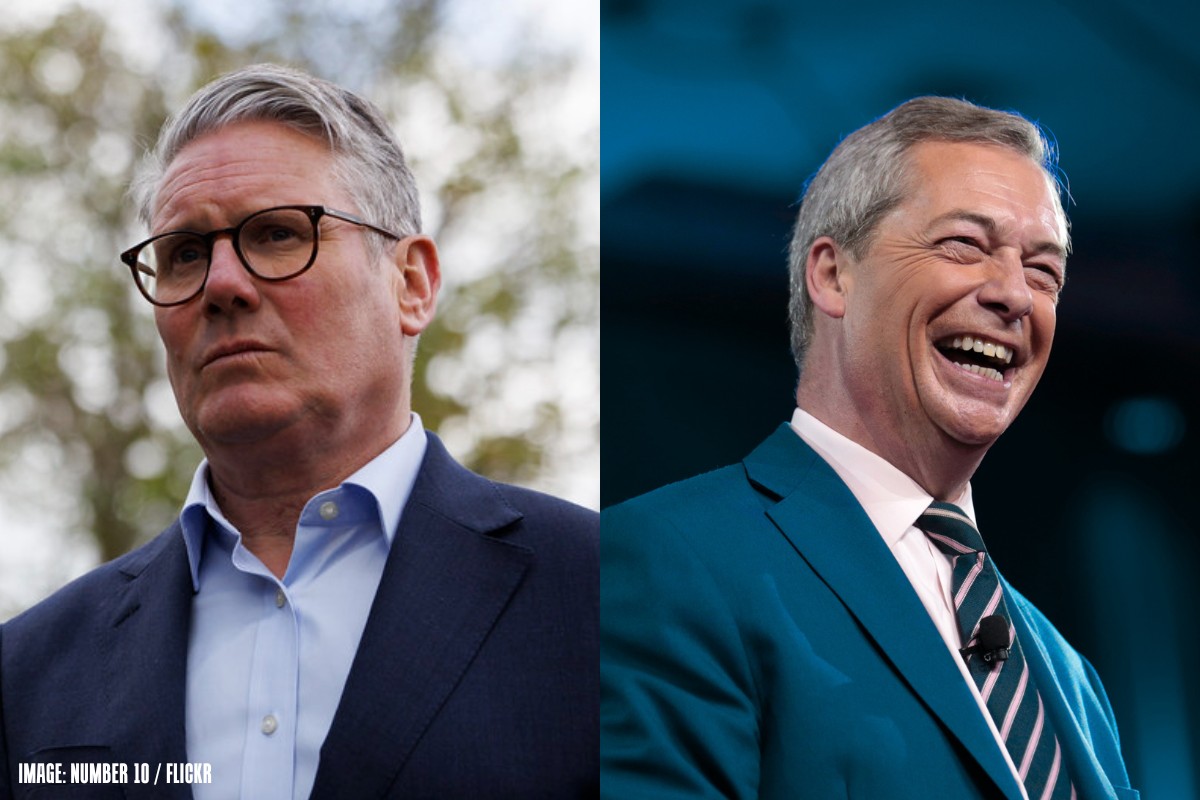
Shocking though these events may be, they aren’t truly a surprise. They are the logical consequence of a government pursuing counter-reforms and attacks, combined with an absence of real answers from the so-called ‘left’.
The openly reactionary wing of the ruling class, meanwhile, is stoking the fires even further, seeking to divide the working class and distract from the crisis of the system.
Elon Musk, the world’s richest man, gave full-throated backing to the UTK demonstration. Delivering an alarming message to the gathered crowds, the tech billionaire proclaimed: “Whether you choose violence or not, violence is coming to you. You either fight back or you die.”
With these foreboding images of civil war, Musk is playing with fire. But he isn’t the only one. We can add to this gallery of racist rogues the likes of Nigel Farage, the big-business backers of Reform UK, the owners of the Daily Mail, the Daily Express, and all of the other right-wing rags.
The crisis of capitalism is only set to deepen. In turn, the class struggle will continue to intensify, causing further polarisation to the left and right.
Along with this, the ruling class itself will split, with a section throwing their lot in with the demagogues, racists, and right-wing lunatics; leaning ever-harder on ‘culture war’ hysteria to cut across the rising class anger in society.
This shows the desperate need for a clear class alternative on the left. Unfortunately, such a force has so far been lacking – as was all too evident on 13 September.
Where was the left?
The UTK demonstration demanded a show of strength from the left and the workers’ organisations, in order to neutralise and demoralise the right, as was seen last summer.
But this did not happen. Instead, the left was woefully absent on 13 September. This demands answers.
The trade unions are the backbone of the working class. The top three unions alone – Unite, Unison, and GMB – represent over three million workers collectively. If they had lifted their little fingers, they could have matched the size of Tommy’s crowd.
Instead, the leaders of both Unite and GMB remained silent. The heads of the Trades Union Congress (TUC) – the coordinating body of the labour movement – did nothing. Perhaps they were too busy wiping their tears over Angela Rayner’s resignation.
Unison, meanwhile, shared a single post on their social media accounts, encouraging their members to go along.
Some might object by questioning whether this is a trade union issue. To this, we reply: anything that threatens the unity of our class is a trade union issue. Anything that serves to distract from the class struggle is a trade union issue.
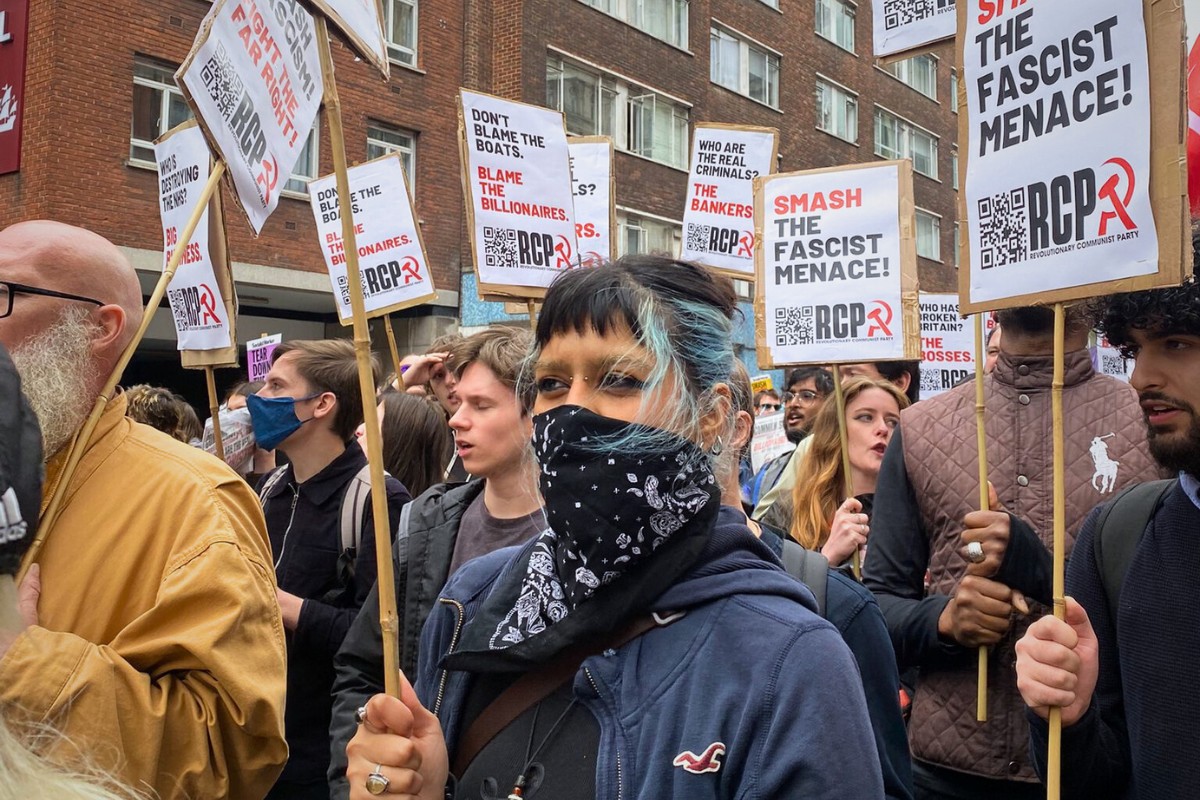
Defending the oppressed sections of our class from racist demagogy is an elementary duty of any workers’ organisation.
The main political beneficiaries of the UTK demo – Farage’s Reform UK – would launch an all-out assault on workers’ rights and regulations, should they come to power. This inaction will therefore come back to bite the trade union leaders, if left unaddressed.
Meanwhile, the leaders of ‘Your Party’ (YP) – the new left party launched by Jeremy Corbyn and Zarah Sultana – have remained similarly quiet. To her credit, Sultana did march and speak at the counter-demo. But the absence of any official mobilisation from YP is disappointing.
Hundreds of thousands have signed up to support YP, seeking a new, socialist alternative to the status quo. A single call to arms from Corbyn and Sultana could have helped to transform the balance of forces on the day.
After months of dither and delay when it comes to actually launching this new party, this failure will only serve to further sap left-looking workers and youth of their energy and enthusiasm.
Similarly, the Palestine Solidarity Campaign has organised massive demonstrations of up to one million over the past two years, since 7 October. Why wasn’t this enormous base mobilised to meet Tommy Robinson and his supporters head on?
The UTK demonstration was led by avowed Zionists. The crowd was awash with Israeli flags. Some rabid protestors proudly tore up a Palestinian flag to cheers. The large turnout for the right on 13 September will also embolden the most pro-Israel and pro-imperialist elements in British society.
These groups failed to counter the UTK demonstration because they are paralysed by pessimism. They are infused with pacifist prejudices, cynicism and demoralisation, and reformist illusions.
Above all, they have no confidence in the power and strength of the working class. They do not believe that it is possible to genuinely transform society. And they flinch at the thought of militant action or a radical, class-struggle programme – the only thing that could mobilise millions and cut the ground from beneath the far right.
What role does ‘Stand Up To Racism’ play?
The most pernicious role of all lies with Stand Up To Racism (SUTR) – a front organisation of the supposedly ‘Marxist’ Socialist Workers Party (SWP), which organised the official counter-demonstration on Saturday.
The SWP called 13 September a “wake up call for the left”. We can only agree. But the SWP, through its various fronts, has been the de facto leadership of the anti-racist movement in Britain for decades. In this scenario, they are the left. Yet they show no signs of waking up.
The approach of SUTR is to depoliticise the struggle against racism as much as possible, and to drain it of any working-class content.
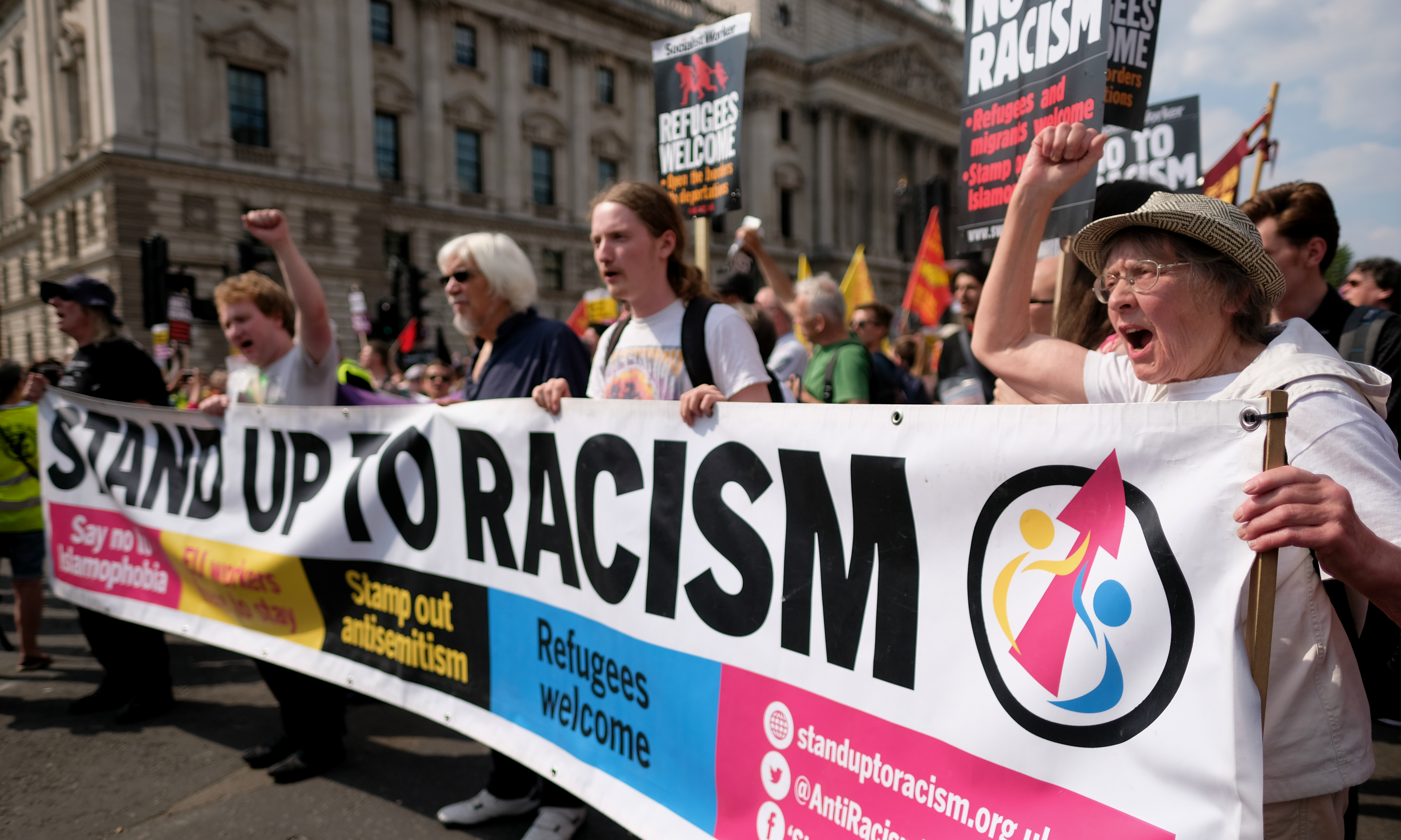
They want to build a ‘broad church’: a cross-class alliance of all and sundry; a popular front of religious and community leaders, business owners, and all sorts of liberal, middle-class elements.
To keep these moderate types and layers on board, SUTR avoids radical ideas and policies like the plague.
Concretely, this has meant maintaining an artificial separation between connected struggles: censoring pro-Palestine speakers at local anti-racism demos, in order to placate Zionist SUTR supporters; or similarly silencing those who attempt to criticise Starmer, in order to appease Labour MPs and councillors, etc.
Equally scandalously, it has meant discouraging militant working-class youth in Muslim and Asian communities from organising and mobilising to drive back the far right, on the grounds that this might ‘inflame tensions’.
Furthermore, it means reducing SUTR’s programme to the lowest common denominator. This can be summed up as: racism and Islamophobia are bad; refugees are welcome; and migrants are good people.
This is nothing but liberal, moralistic virtue-signalling. It does nothing to address the migrant crisis, nor the plight of asylum-seekers forced to flee imperialist wars. And it does nothing to address the real insecurities of working-class communities around shortages of housing, jobs, and services.
Hundreds of thousands of people will not take to the streets, and risk a confrontation with far-right thugs, on the basis of moral platitudes alone.
And nor will wider discontented layers – bought in by the chauvinistic, culture-war rhetoric of Robinson et al. – be won over by such hollow sloganeering.
These sections of society are disgusted by the liberal establishment, including the status quo they represent and the cynical identity politics they deploy. By tying themselves to the liberals, and effectively echoing their ideas, the ‘left’ is signing its own death warrant.
To fight the right wing, we need a clear, working-class programme, aimed against the billionaires, landlords, and bankers, and the Starmer government that does their bidding.
But a coherent political explanation and programme was entirely absent from the speeches, placards, and chants on the counter-demonstration – with the exception of the RCP bloc.
The sentimental, petty-bourgeois outlook of SUTR is far from benign and harmless.
By hysterically labelling all Reform UK supporters – alongside the hundreds of thousands who turned out on 13 September – as nothing but hateful ‘fascists’ and ‘racists’, they are actively entrenching the culture-war divide, and weakening the left.
By implicitly mobilising people to vote for Starmer’s Labour to keep Reform out, as SUTR did in last year’s local elections and in the Runcorn and Helsby by-election, they are de facto aiding Britain’s ruling party and the establishment – those stoking the fires of racist reaction in the first place.
By providing a convenient left cover for the trade union bureaucracy – who affiliate to and subsidise SUTR – they allow the tops of the labour movement to sit on their backside and merely pay lip service when it comes to the fight against racism.
By failing to mobilise properly for the 13 September counter-protest, they put the few thousand people who did turn up in real danger of physical injury. This light-mindedness is reckless.
Truthfully, if they can’t mobilise properly, it would be better to do nothing at all. Otherwise, the end result is only greater demoralisation, confusion, and embarrassment for the left.
For all of these reasons, objectively, SUTR plays a reactionary role: lowering consciousness; disorientating workers and youth; and leaning into the culture war, rather than pushing a class-based strategy and programme.
This organisation is therefore an obstacle to the movement. The greatest service that the SWP could provide is to step aside, dissolve SUTR, and relinquish its suffocating grip on the struggle against racism.
Is fascism on the rise?
In their analysis, the SWP begin by describing the UTK demonstration as “a swarm of over 100,000 fascists and racists”. Such hysteria does nothing but sow confusion.
Marxists understand fascism as a movement that aims to annihilate the organisations of the working class. If there is currently a mass fascist movement on the streets of Britain, numbering in the hundreds of thousands, then this would require us to draw certain serious conclusions. If you say A, then you must say B, C, and D.
If this were truly the case, the task of the day would be urgently forming defence committees, and arming the working class for a showdown between the forces of revolution and counter-revolution.
Is this what the SWP is really suggesting?
If this was not “a swarm of over 100,000 fascists and racists”, then what was the nature of the UTK demonstration?
Firstly, we should state that there clearly was a fascist presence at this protest. Nazi salutes and chants of “sieg heil!” could be observed. And there was no shortage of knuckledraggers looking for a scrap.
What’s more, this demonstration was organised and led by the far right. Tommy Robinson was a founder of the English Defence League. His coterie includes all manner of nationalists, white supremacists, and lunatics.
But that does not exhaust the question. This was a demonstration of hundreds of thousands. And any mass movement is by definition heterogenous. The same is true of the ‘Raise the Colours’ protests of the past couple of months.
The centre ground is collapsing. People are looking for answers to the deep crisis in society. This creates a powerful vacuum. And in the absence of a strong left answer, accidental figures can channel some of the rage in society. Class anger can express itself in contradictory, distorted – even reactionary – ways.
Most of the polarisation to the right has been captured by Nigel Farage’s brand of populism. But it seems Tommy Robinson is now also trying to capitalise on the widespread anti-establishment rage.
What’s notable about Robinson’s platform is that it has shifted quite noticeably from the unadulterated racism and chauvinism of a decade ago.
The march on 13 September was undoubtedly anti-migrant and Islamophobic. Its main slogans were “stop the boats” and “we want our country back”.
But alongside this, there was also another message: the Starmer government isn’t listening to us; ordinary people have been lied to and forgotten about; the establishment and the media are all corrupt; the whole system is rigged; Britain is broken, and we need to make it great again.
The clear anti-establishment character of this demonstration cannot be ignored. This was, in many ways, a plebeian revolt of the most backward sections of society against the government and the status quo it upholds.
Listen to the kind of language Robinson uses: “The revolution has started, and you can’t stop it”; “today is the spark of a cultural revolution in Great Britain”.
This is the exact same kind of demagogic rhetoric that has allowed Farage and Reform UK to climb in the polls. What’s more, the platform of UTK was so vague that almost any social group could attach their own meaning to it.
The vacuum in British politics has created a cyclone, pulling in all sorts of different layers: lumpen types; discontented middle-class elements; but also backward and alienated sections of the working class – those who feel left behind and forgotten.
Last summer, we described the far-right pogromists terrorising Britain’s streets as “human dust”: the lumpenised, declassed dregs of society.
A year on, with no solution coming from the political establishment, this phenomenon has further developed, evolved, and grown – injecting further instability into the equation for Starmer and the ruling class.
How can we fight the right?
These events will embolden the racist scum of British society. The workers’ movement must therefore remain vigilant, and organise to come to the aid of Muslim, black, and Asian communities that come under attack from the far right.
The wider task confronting the left and the workers’ movement is to break the grip that both Farage’s populism and Robinson’s racist demagogy have over sections of the working class, in order to neutralise them as a political force.
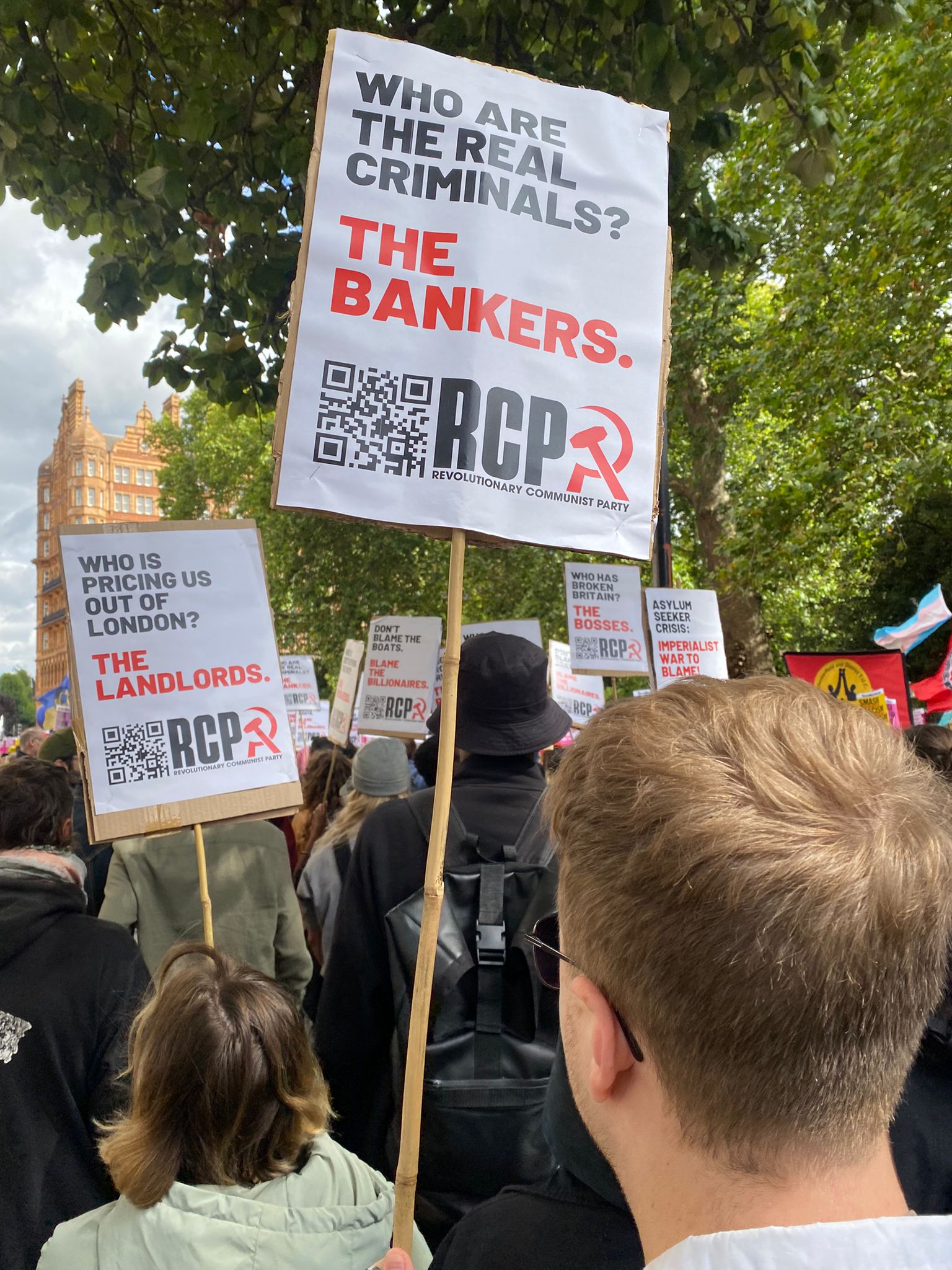
To do this, a radical class-based programme is needed to address the burning problems facing workers in their everyday lives; to eradicate the fertile soil upon which racism and the far right thrive.
Farage and Robinson blame migrants for the housing shortage. We must say: the landlords are to blame. Expropriate all the empty properties! Nationalise the land and construction companies!
They blame migrants for the cost-of-living crisis. We must say: the bosses and bankers are to blame. Nationalise the banks, utility companies, and supermarkets! For a socialist plan of production!
They blame minorities and migrants for crime and social decay. We must say: this whole system is dragging us kicking and screaming into barbarism. To create a society worth living in, we must wage war on the capitalist system and its defenders!
This is the kind of programme that the left needs in order to pull the rug from underneath the feet of these reactionary demagogues and charlatans. This is the programme that the RCP is fighting to arm the movement with.
What is the real balance of forces?
At first glance, the present situation may look bleak. But there is no need to sink into despair. We must maintain level heads.
13 September was not a real reflection of the balance of forces in society. The working class has never been stronger. When organised and mobilised, on the basis of a clear class alternative, it could swipe away any threat that stands before it.
We are living through a period of protracted crisis. That means sharp and sudden shifts to the right and to the left. Look at the militant mass movement in France. Look at the revolutions in Nepal, Indonesia, and Bangladesh. Such events can and will arrive on our shores, as night follows day.
The radicalisation to the right is mirrored by a deep radicalisation to the left. Between 30-40 percent of young people in Britain are open to communism. And the Revolutionary Communist Party is seeking to connect with this yearning for socialist change.
The events of 13 September will shake up the consciousness of millions of people. The whip of reaction will spur forward the leftward radicalisation of workers and youth.
The urgent task in front of us is to build the forces of genuine communism, in order to forge a revolutionary party that can lead the working class to victory.

